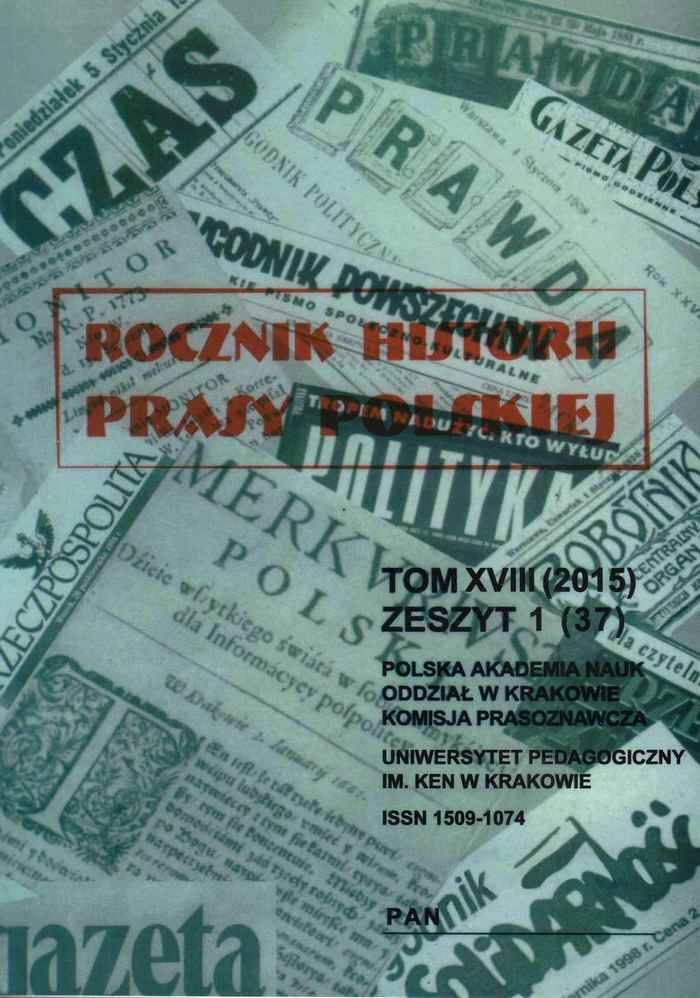Narzędzia samoregulacji mediów w Polsce i innych wybranych krajach europejskich. Historia i współczesność
Słowa kluczowe:
samoregulacja, media, system medialny, odpowiedzialność mediówAbstrakt
Samoregulacja mediów może mieć istotny wpływ na kształtowanie się kultury dziennikarskiej i poziomu etycznego mediów. Jej skuteczność jest jednak uzależniona od stopnia instytucjonalizacji narzędzi samoregulacyjnych i ich powszechnej akceptacji. Różny jest ten poziom w różnych systemach medialnych, co często warunkowane jest historycznie. Artykuł za cel przyjmuje prezentację historycznego rozwoju samoregulacji trzech systemów medialnych (francuskiego, brytyjskiego i fińskiego) wpisujących się w trzy różne modele systemów medialnych opisane przez Daniela Hallina i Paolo Manciniego i zestawienie ich z rozwojem samoregulacji mediów w Polsce.
Bibliografia
Baisnee O., Balland L., France: Much ado about (almost) nothing?, [in:] Mapping Media Accountability in Europe and Beyond, eds. T. Eberwein, S. Fengler, E. Lauk, T. Leppik-Bork, Köln 2011.
Bertrand C.J., Deontologia mediów, Warszawa 2007.
Flach J., 25-lecie, [w:] XXV-lecie Syndykatu Dziennikarzy Krakowskich, Kraków 1927.
Hallin D., Mancini P., Systemy medialne. Trzy modele mediów i polityki w ujęciu porównawczym, Kraków 2007.
Hans Bredow Institut, EMR, Final Report.Study on Co-Regulation Measures in the Media Sector. Study for the European Commission, Directorate Information Society and Media, 2006, http://ec.europa.eu/avpolicy/info_centr/library/studies/index_en.htm.
Harju A., Journalistisen tyon saantely ja ammattietiikka, Tampere 2002.
Heikkilä H., Kylmälä T., Finland: Direction of change still pending, [in:] Mapping Media Accountability in Europe and Beyond, eds. T. Eberwein, S. Fengler, E. Lauk, T. Leppik-Bork, Köln 2011.
Heinonen A., Vahtikoiran omatunto. Journalismin itsesaantely ja toimittajat, Tampere 1995.
Iłowiecki M., Pilnowanie strażników. Etyka dziennikarska w praktyce, Warszawa 2012.
International Principles of Professional Ethics in Journalism, [w:] K. Nordenstreng, E.G. Manet, W. Kleinwächter, New International Information and Communication Order, Prague 1986.
Jaskiernia A., Media masowe w demokratycznych procesach wyborczych, Warszawa 2008.
Jempson M., Powell W., United Kingdom: From the Gentlemen’s lub to the Blogosphere, [in:] Mapping Media Accountability in Europe and Beyond, eds. T. Eberwein, S. Fengler, E. Lauk, T. Leppik-Bork, Köln 2011.
Kononiuk T., O neutralizacji norm etycznych, „Zeszyty Prasoznawcze” 1998, nr 3–4.
Magiera W., Syndykaty dziennikarskie w dwudziestoleciu międzywojennym, „Zeszyty Prasoznawcze” 1990, nr 2–4, s. 124.
Mäntylä J., Karilainen J., Journalistietiikan kehitys Suomessa ja Euroopassa 1995–2007, Tampere 2008.
Piontek D., Paradoks wolnych mediów, [w:] W kręgu mediów i polityki, pod red. D. Piontek, Poznań 2003.
Pisarek W., Kodeksy etyki dziennikarskiej, [w:] Dziennikarstwo i świat mediów, pod red. Z. Bauera i E. Chudzińskiego, Kraków 2008.
Principles adopted by the Congress of the International Union of Press Associations, [w:] K. Nordenstreng, E.G. Manet, W. Kleinwächter, New Intenational Information and Communication Order, Prague 1986.
Rezolucja 1003 Zgromadzenia Parlamentarnego Rady Europy z 1 lipca 1993 r. w sprawie etyki dziennikarskiej, „Zeszyty Prasoznawcze” 1994, nr 3–4.
Sobczak J., Etyczne uwarunkowania funkcjonowania mediów. Część 2, „Studia Medioznawcze” 2014, nr 2.
Strasser S., Registering Reporters:How Licensing of Journalists Threatens Independent News Media, Washington 2010 [http://cima.ned.org/sites/default/files/CIMA-Licensing_of_Journalists.pdf].
Urbaniak P., System Odpowiedzialności Mediów jako przejaw samoregulacyjnych mechanizmów kształtowania rynku medialnego, „Studia Medioznawcze” 2011, nr 2.
Wojciechowski P., Sprawozdanie Rady Etyki Mediów, „Forum Dziennikarzy” 1998, nr 10–11.

